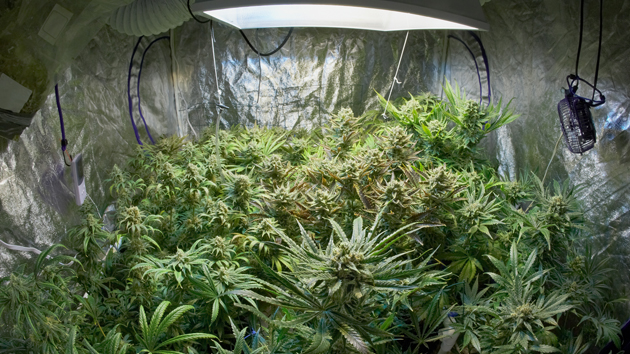
<a href="https://www.flickr.com/photos/thcganja/416947290/in/faves-88589852@N00/">Niek Sprakel</a>/Flickr
On the surface, legalizing marijuana in California next year seems like a slam dunk. No other part of the country is more economically and culturally accepting of cannabis than the Golden State, where three northern counties produce the vast majority of the nation’s domestically grown weed. But the size and power of California’s $1.1 billion pot industry poses a unique challenge to legalization advocates. Existing pot farmers and vendors want any new California law to protect them from the high taxes and strict regulations that have been enacted by other legal-pot states. “The first way we can lose is to go too far, to demand too much in the text of our initiative,” veteran marijuana campaigner Bill Zimmerman said last week in a speech at an industry conference in Oakland.
Any recreational pot measure must also appeal to the moderate voters who make up a third of the electorate, a group that’s “unhappy about marijuana but reluctantly willing to legalize it,” said Zimmerman, who shepherded through Prop. 215, the state’s pioneering medical marijuana initiative, nearly 20 years ago. “Our 2016 effort has to be guided by an understanding of just how far these voters will go. Our beliefs about what is right have to be put aside in the interest of what is possible.”
A 2016 measure could just as easily lose, he added, if it splits the pro-marijuana community, as the state’s first failed recreational pot initiative, Proposition 19, did four years ago. (Fearing a drop in prices, all three counties in the state’s pot-growing Emerald Triangle voted against it.) “Our opponents will jump at the chance to advertise our disagreements,” he said, which could be “devastating.”
Crafting a successful initiative will be an unusually delicate balancing act, admits Lynne Lyman, California director of the Drug Policy Alliance (DPA), the group expected to take the lead in drafting the measure. “There are so many issues that need to be researched and debated and vetted just to come to a consensus within the marijuana community,” she says, “and then we have to make sure that the outcomes of these deliberations are things that the public wants.”
Some 58 percent of Californians now support legalization, according to a poll DPA conducted last February. “California history is replete with examples of initiatives that started with far greater support, yet still lost on election day,” Zimmerman cautions. But there’s also some buyers remorse among legalization advocates in states where they compromised to win support from groups such as law enforcement. Critics cite problems with Washington’s strict stoned driving law, for example, and say taxes and permit fees in all four recreational pot states are too high to support small producers or put an end to the black market, which can offer lower prices.
Dale Sky Jones is executive chancellor of Oaksterdam University, the cannabis college founded in Oakland by Richard Lee, who was the driving force behind California’s Prop. 19. Jones says the mainstreaming of cannabis now gives the state the chance to pass an initiative that’s much more sensitive to the needs of the industry—in particular to the yeoman pot farmers who prop up Northern California’s rural economy. “I say we draw the line to make sure they are part of the solution,” she says, “or else they will continue to be part of the problem.”
Bringing the Emerald Triangle growers out of the shadows would probably involve granting small farmers tax and regulatory exemptions not available to industrial growers. It could also reward outdoor growers for their smaller carbon footprints. (Indoor grows have been estimated to use a staggering 9 percent of California’s electricity). The incentives would need to convince growers it’s worthwhile to open their doors to environmental and health inspectors—no small task in a state where illegal growers export pot nationwide and the cultivation of medical marijuana has gone virtually unregulated.
But there are signs the pot industry is ready for a change. Bill Panzer, an attorney for Emerald Triangle growers, says his clients are now much more in favor of legalization than they were four years ago. “They want to come out of the cold. They want not to worry about the helicopters,” he says. “But they want it in a way that’s economically feasible.”
Of course, pot growers don’t account for a large part of the electorate, and the pro-legalization folks ultimately could decide to stick to what’s worked in other states. Jones, for one, thinks that would be a mistake. “I don’t know if you can pass an initiative without the base,” she says. “I know the base is willing and able to be extremely disruptive. They have it in them. And then you are looking at 2020.”












